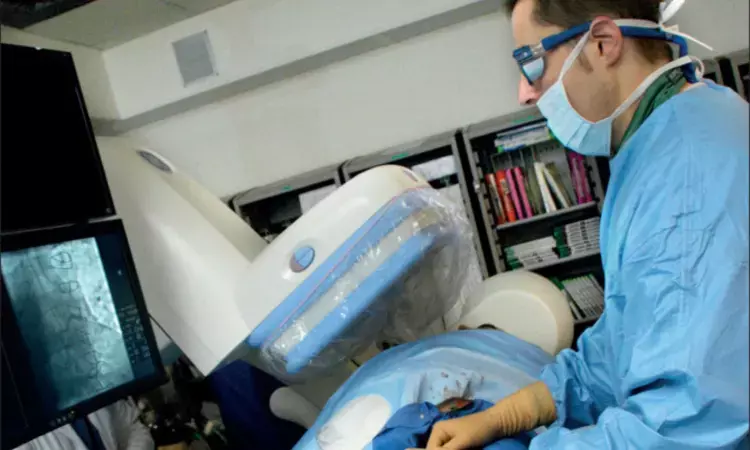- Home
- Medical news & Guidelines
- Anesthesiology
- Cardiology and CTVS
- Critical Care
- Dentistry
- Dermatology
- Diabetes and Endocrinology
- ENT
- Gastroenterology
- Medicine
- Nephrology
- Neurology
- Obstretics-Gynaecology
- Oncology
- Ophthalmology
- Orthopaedics
- Pediatrics-Neonatology
- Psychiatry
- Pulmonology
- Radiology
- Surgery
- Urology
- Laboratory Medicine
- Diet
- Nursing
- Paramedical
- Physiotherapy
- Health news
- Fact Check
- Bone Health Fact Check
- Brain Health Fact Check
- Cancer Related Fact Check
- Child Care Fact Check
- Dental and oral health fact check
- Diabetes and metabolic health fact check
- Diet and Nutrition Fact Check
- Eye and ENT Care Fact Check
- Fitness fact check
- Gut health fact check
- Heart health fact check
- Kidney health fact check
- Medical education fact check
- Men's health fact check
- Respiratory fact check
- Skin and hair care fact check
- Vaccine and Immunization fact check
- Women's health fact check
- AYUSH
- State News
- Andaman and Nicobar Islands
- Andhra Pradesh
- Arunachal Pradesh
- Assam
- Bihar
- Chandigarh
- Chattisgarh
- Dadra and Nagar Haveli
- Daman and Diu
- Delhi
- Goa
- Gujarat
- Haryana
- Himachal Pradesh
- Jammu & Kashmir
- Jharkhand
- Karnataka
- Kerala
- Ladakh
- Lakshadweep
- Madhya Pradesh
- Maharashtra
- Manipur
- Meghalaya
- Mizoram
- Nagaland
- Odisha
- Puducherry
- Punjab
- Rajasthan
- Sikkim
- Tamil Nadu
- Telangana
- Tripura
- Uttar Pradesh
- Uttrakhand
- West Bengal
- Medical Education
- Industry
FLASH Trial: AI-Based Coronary Angiography Noninferior to OCT Guidance in PCI

Korea: The FLASH Trial has revealed that artificial intelligence-based fully automated quantitative coronary angiography (AI-QCA) is noninferior to optical coherence tomography (OCT)-guided percutaneous coronary intervention (PCI) in achieving minimal stent area (MSA) post-procedure. Both methods showed similar outcomes in OCT-defined endpoints, highlighting AI-QCA as a promising, efficient, and fully automated alternative to the traditional OCT-guided approach.
The findings were published online in JACC: Cardiovascular Interventions on October 30, 2024.
Recently developed fully automated artificial intelligence-based quantitative coronary angiography offers real-time, objective, and consistent analysis of coronary angiography. It delivers quantitative insights without adding extra time or requiring additional labor. AI-QCA leverages advanced machine learning algorithms to analyze coronary angiography images, offering precise, automated measurements without requiring operator interpretation. This technology has the potential to streamline PCI by reducing variability, improving decision-making speed, and ensuring consistent procedural guidance.
Against the above background, Jung-Min Ahn, Division of Cardiology, Asan Medical Center, University of Ulsan College of Medicine, Seoul, Korea, and colleagues aimed to assess the effectiveness of AI-QCA–assisted percutaneous coronary intervention versus OCT-guided PCI in evaluating post-procedure outcomes.
For this purpose, the researchers enrolled 400 patients with significant coronary artery disease undergoing PCI across 13 centers in South Korea. Participants were randomly assigned in a 1:1 ratio to either AI–QCA–assisted or OCT-guided PCI. The primary endpoint was the post-PCI minimal stent area evaluated using OCT. The study tested the noninferiority of AI–QCA–assisted PCI compared to OCT-guided PCI in achieving post-PCI MSA, with a noninferiority margin set at 0.8 mm².
The research brought to light these significant results:
- A total of 395 patients (199 in the AI-QCA group and 196 in the OCT group) were included in the primary endpoint analysis.
- The post-PCI minimal stent area (MSA) was 6.3 ± 2.2 mm² in the AI-QCA group and 6.2 ± 2.2 mm² in the OCT group (difference, −0.16).
- Other OCT-defined endpoints showed no significant differences between groups, including stent under expansion (50.8% in the AI-QCA group versus 54.6% in the OCT group), dissection (15.6% in the AI-QCA group versus 12.8% in the OCT group), and untreated reference segment disease (15.1% in the AI-QCA group versus 13.3% in the OCT group).
- The AI-QCA group exhibited a higher incidence of stent malapposition than the OCT group (13.6% versus 5.6%).
The researchers demonstrated that AI–QCA–assisted PCI is noninferior to OCT-guided PCI in achieving optimal minimal stent area (MSA), with similar rates of procedural complications, OCT-defined endpoints, and 6-month clinical outcomes. The FLASH trial highlights AI-QCA as a promising tool for guiding coronary interventions, offering particular advantages in resource-limited settings or for less complex coronary artery disease cases where the benefits of intravascular imaging remain uncertain.
Looking ahead, the researchers emphasize that larger clinical trials focusing on long-term clinical outcomes will be essential to fully define the role of AI-QCA-assisted PCI in everyday interventional cardiology practice.
Reference:
Kim, Y., Yoon, H., Suh, J., Kang, S., Lim, Y., Jang, D. H., Park, J. H., Shin, E., Bae, J., Lee, J. H., Oh, J., Kang, D., Kweon, J., Jo, M., Yun, S., Park, D., Kim, Y., Park, S., Park, H., . . . Suh, J. (2024). Artificial Intelligence–Based Fully Automated Quantitative Coronary Angiography vs Optical Coherence Tomography–Guided PCI (FLASH Trial). JACC: Cardiovascular Interventions. https://doi.org/10.1016/j.jcin.2024.10.025
Dr Kamal Kant Kohli-MBBS, DTCD- a chest specialist with more than 30 years of practice and a flair for writing clinical articles, Dr Kamal Kant Kohli joined Medical Dialogues as a Chief Editor of Medical News. Besides writing articles, as an editor, he proofreads and verifies all the medical content published on Medical Dialogues including those coming from journals, studies,medical conferences,guidelines etc. Email: drkohli@medicaldialogues.in. Contact no. 011-43720751


